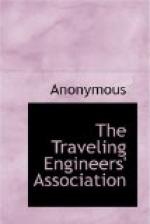168. Q. If an intermediate discharge valve breaks or sticks open, what effect will it have on the compressor, and how may it be located?
A. If an intermediate discharge valve breaks or sticks open, no air will be compressed by that end of the compressor where is located the defective valve, as the air will simply flow back and forth from the high to the low pressure cylinders; no air will be taken in from the atmosphere through the strainer as the pistons move from the defective valve.
169. Q. If a final discharge valve breaks, what effect will it have on the compressor?
A. Main reservoir air will be free to return to the high pressure cylinder as the high pressure piston moves from the defective valve; therefore, no air will be taken in through the receiving valve of the high pressure air cylinder at the end where is located the defective valve. The low pressure piston will make a slow stroke toward the defective valve and a normal stroke from it; while the high pressure piston will make a slow stroke toward the defective valve and a quick stroke from it. Defective air valves may generally be located by noting the temperature of the valve chamber in which they are located.
170. Q. What will cause the compressor to run hot?
A. Running the compressor too fast; working against high pressure; air piston packing rings leaking; air cylinder worn; air passages or discharge pipe partially stopped up; air valves leaking; air valves stuck shut; or lack of lubrication.
171. Q. How should the air end of the compressor be oiled, and what grade of oil used?
[Illustration: Fig. 20. High Pressureiston Moving Upward. Low Pressure Piston at Rest.]
A. Oil should be used sparingly in the low pressure cylinder, but more is required in the high pressure cylinder, owing to higher temperature. A good quality of valve oil should be used.
172. Q. How is the steam end of the compressor affected by the use of too much oil?
A. This may cause the compressor to short stroke, and where the piston type of valve is used, may cause the compressor to stop.
L-T EQUIPMENT
AUTOMATIC CONTROL VALVE
173. Q. What is the duty of the control valve?
A. To admit air from the main reservoir to the locomotive brake cylinders when applying the brakes; to automatically maintain the brake cylinder pressure against leakage; to develop the proper brake cylinder pressure regardless of piston travel; and to exhaust the air from the brake cylinders when releasing the brake, in all automatic applications of the brake.
174. Q. Explain the operation of the control valve when making an automatic service application of the brake.




